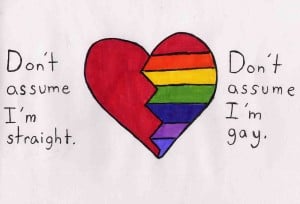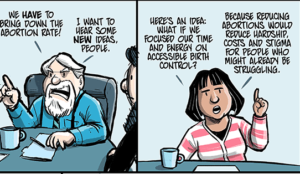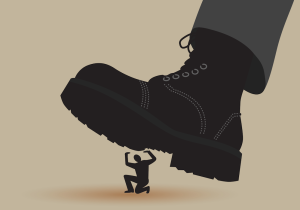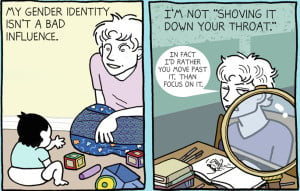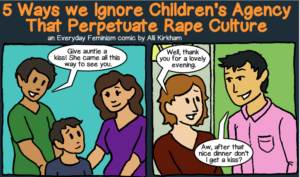Charities can be incredibly problematic. Nonetheless, humanitarianism is a billion dollar industry!
Therefore, we must become aware of the problems facing most charities and support those organizations that best collaborate with and empower low-income communities.
I used to uncritically donate to a number of charities myself. I’d save up my loose change, and when the jar filled, I’d send a donation to this or that cause. Sometimes I’d “adopt” an endangered animal. Sometimes I’d “feed” a starving child. Sometimes I’d “educate” an orphan.
I was always so excited when the certificate of appreciation came in the mail. (Cue the warm fuzzies, not to mention a holier-than-thou superiority complex.)
Then I took the next step: I traveled abroad – to Kenya – to volunteer.
And it was there, surrounded by other white American college student volunteers on summer vacation, that I started to perceive such charitable organizations differently.
It was this experience in Kenya that partially inspired my collaborative anthropological research in another part of the continent: Mali and Burkina Faso. And part of my research focuses on the humanitarianism industry.
I examine how outsiders – typically wealthy white folks working for the United Nations, the Peace Corps, the Red Cross, Caritas, CARE, American and European armies, and so on – interact with and attempt to “improve” local communities.
For better or worse – and usually, it’s for worse – from East to West Africa, I’ve encountered a wide array of humanitarian organizations and volunteers.
Despite the presence of so many outside charities, though, the livelihoods of most of the community members remain unchanged.
In one case, for instance, along the road leading into a town, there were dozens of signs, each one representing a different organization. Nonetheless, the majority of the local residents remained under the poverty line and had difficulty accessing education, healthcare, and food security.
Many of the charities that I encountered in this town were more concerned with their own objectives, reputations, and experiences than they were with facilitating local empowerment and addressing sources of poverty.
Many were wasteful, spending the bulk of donations on salaries, advertisements, and over-the-top travel expenses. And a number of volunteers admitted to being more interested in tourism than actual community engagement.
Many charities were outright imperialist, telling community members what they should or shouldn’t do!
Of course, I’m not suggesting that I didn’t come across some organizations that were doing great, collaborative work with local groups.
Nor am I necessarily suggesting that people shouldn’t engage in charity work at all.
However, before you next send a donation or volunteer abroad, you should consider some of the problems characteristic of many charitable organizations.
1. Promotion of the White Savior Industrial Complex
One of the problems of typical charity work in other countries is that it’s usually directed and employed by “white saviors.”
A white savior is someone who attempts to “fix” the problems of struggling communities of color. Often ignorant of the social, cultural, religious, and political complexities of these communities, white saviors paternalistically claim to “rescue” the so-called suffering victims of poverty and warfare.
I was a white savior when I arrogantly flew to Kenya to “save” poor students by volunteering at an under-resourced school. The other foreign volunteers were white saviors, too.
Many celebrities – I’m thinking of the likes of Bono and George Clooney – who use their fame in order to, supposedly, raise funds for “starving children,” for example, are also white saviors.
But, you might ask, what’s wrong with volunteering and raising funds for those in need?
Well, during fundraisers and events, even well intentioned white saviors regularly speak over and actively silence the communities they claim to want to help.
Indeed, reflecting centuries of political, cultural, and narrative imperialism, white saviors tend to swoop in and reproduce supremacist discourses, rather than working with and providing a platform for marginalized groups to articulate real grievances and produce their own narratives.
Not surprisingly, many in these communities accuse NGOs and their spokespersons of exploitation, suggesting that they’re more interested in improving their images than they are about actually helping impoverished groups around the world.
This is bad news. Because even well-intentioned white saviors thus prevent community-driven collaboration that more effectively addresses local issues.
2. Reproduction of Ignorant, Racist Stereotypes of the Global South
Aka, “Do they know it’s Christmastime at all?”
White saviors tend to remain unknowledgeable, sometimes reproducing racist stereotypes regarding communities of color.
While I was in Kenya, for example, there was a fellow volunteer who continued to exoticize the host family as “pagan” worshippers of the “sun god.” Of course, if they had practiced some form of indigenous or borrowed religion that revered the sun, that would’ve been fine.
But the family was, in fact, quite devoutly Christian.
Nonetheless, this white American volunteer would only perceive them through the racist lens – that links whiteness with Christianity and “civilization” on the one hand, and blackness with “paganism” and “primitiveness” on the other – that continues to be reinforced in the US.
Similarly, many foreign organizations are quite ignorant of the cultural, social, economic, and political lives of the peoples with whom they work.
Instead of collaborating with local communities, most decisions regarding charities’ activities are decided in the United States and Europe among uninformed businesspersons.
Then, upon making a particular decision – say, about setting up a microfinance scheme or purchasing a piece of machinery for a village – they send some representatives from the organization to implement it.
Even at this stage, there is often little engagement with local groups.
Instead, the organizations’ representatives often spend little time in the actual communities. They might ship the machinery or delegate a scheme and only show up for the (often staged and exoticized) welcomes and/or farewells (directed at the charities’ cameras, and thus, websites).
Without overstating the case, such ignorant, non-collaborative intervention can have negative consequences.
At best, a given project just won’t be effective.
At worst, though, a given scheme could actually exacerbate local social or political tensions within a given group or among multiple communities. Or it could inadvertently support an oppressive regime.
Humanitarian organizations should improve, rather than worsen, the humanitarian circumstances that local communities experience.
And when a lot of time, money, and effort (no matter how misplaced) go into organizing charity work, that energy should be appropriately harnessed, not squandered.
The historical and cultural ignorance so characteristic of many charities is often also regurgitated in racist advertisements.
Instead of disrupting dangerous, one-dimensional stereotypes about the Global South, these advertisements tend to reinforce them.
Often to a soundtrack akin to “In the Arms of an Angel,” these commercials regularly feature a white savior narrating the non-contextualized horrors of poverty afflicting a given community in a nameless, faraway, and supposedly war-torn land.
Such advertisements regularly depict foreign people of color sitting languid; they’re rarely seen working, studying, or creatively engaging with others. And they rarely speak. The white savior speaks for them.
Consequently, this marketing “justifies” non-collaborative humanitarianism because it depicts low-income communities as unable to speak and make decisions for themselves.
It suggests that outside “experts” know better what a local community needs, rather than the local community itself.
For years, many in the Global South have criticized these problematic depictions. And recently, they’ve creatively turned to social media to satirize the ignorance so typical of the humanitarian industry.
Consider, for instance, “Radi-Aid” (a spoof of Band-Aid), where Africans rallied one another to raise money to send radiators to Norway in order to save the suffering Norwegians from freezing to death.
Clearly, it is only through replacing a patronizing white savior complex with cultural awareness and critical empathy that actual community-led collaboration can take place.
3. Committing to Charity Work – But with Strings Attached
Here’s another problem characteristic of many charities: Despite being labeled “not for profit,” often someone – and sometimes numerous people – make a lot of money off of charity organizations.
And guess what. They’re not the people who need it.
Studies show that among many NGOs, the bulk of donations go to advertising costs, salaries, cushy accommodations, that “free” tote bag, and so on. Very little of your “for less than a dollar per day” goes to the crying children on your TV screen.
And large governmental organizations do little better.
Of course, administrative costs are necessary for any organization. But even the small percentage of funds that makes it through isn’t always freely available to the communities who need it.
Frequently, in order to access “charity,” low-income communities have to agree to some pretty imposing conditions.
“Want improved access to birth control? You must let this privileged ecotourist live in your community for two months.”
“Need a well dug? First you must restructure your economy to make it more ‘competitive’ (read: capitalist).”
“Want some food? Well, first you need to reject your own beliefs and worldview and accept the Bible.”
Supremacist in nature, these conditions are incredibly problematic because they prohibit poor communities from managing the resources intended for them.
Plus, these conditions often attempt to alter indigenous values and practices.
The idea of humanitarianism – particularly humanitarianism from places like Europe and North America directed at places in the Global South – is regularly an imperialist value judgment.
Especially when it takes the form of international missionary work, for example, charities impose their cultural and religious values upon vulnerable communities. Essentially, these charity workers leverage dire economic needs against their desire to spread a certain, often foreign, message.
But perhaps even more egregious, these conditions for accessing assistance are attempts to profit off of someone else’s poverty!
That’s right. Mission work is big business, as is ecotourism and austerity.
4. Failing to Address Systematic Poverty
Despite what advertising (or certain media or political personalities) might tell you, certain people are not poor for any inherent biological or cultural reason.
Instead, communities are impoverished because economic and political structures limit their upward mobility.
These structures are a product of colonial imperialism, whereby a handful of countries in Europe, plus the United States, forcibly entered territories in the Americas, Africa, Asia, and Oceania.
They enslaved much of the local population, stripping them of their land and forcing them into industrial-style labor. And despite long and dangerous working conditions, the colonized people received little to no economic benefit.
Instead, the colonizers pocketed everything.
And contemporary neocolonialism reproduces many of the same economic and political structures that limit upward mobility in the Global South.
Instead of foreign governments, now it’s primarily foreign corporations that alienate poor communities from land and labor, stripping locals of most potential profits and restricting their abilities to escape these oppressive structures.
Thus, the reason for European- and American-driven charity work in the first place is the result of centuries of predatory European and American imperialism.
Nonetheless, charity organizations rarely address systematic poverty.
Why?
First, it is not in these countries’ economic interests to restrict their private sectors’ (neocolonial) investment in poor countries.
Reproducing a “blame the victim” viewpoint, they fail to turn the lens onto themselves, ask some difficult questions, take responsibility for global poverty, and commit to changing the systems from which they benefit.
For example, has there been a food shortage in the southern Sahara? Yes.
But the incredibly shortsighted solution has been for humanitarian organizations to ship cheap, often inedible and non-nutritious food to countries like the Sudan, Chad, Niger, and Mali.
And while such food is needed immediately – and certainly I’m not suggesting that wealthy countries with food surpluses don’t send it – few charities are also committed to forcing these same countries to stop the economic and military interventions that have destabilized parts of the southern Sahara in the first place, thereby restricting their agricultural sector.
Few charities are also demanding that the United States and Europe dramatically curb their production of greenhouse gases, which has exacerbated global climate change and prolonged a major drought in – you guessed it! – the southern Sahara.
As a result, the assistance falls short. It fails to actually remedy food insecurity and risks creating a relationship of dependency upon food aid.
Second, charity itself is big business.
Governmental and non-governmental organizations make money through public and private donations, sure. But they also make huge profits through the contracts that they sign with countries in need.
Do you think it’s in the organizations’ interest, then, to fully alleviate that need? When the need goes away, so does the contract.
Now, I understand that your “conspiracy theory” flag might be fluttering right now. But I’ve talked to international aid workers who have suggested just this.
Both because charity work rarely addresses the causes of systemic poverty and because it’s often interested in increasing donations and contracts, many humanitarian projects are short-lived and ultimately ineffective.
Frequently, what’s more important than charity work is the illusion of charity work.
Want a “successful” charity? 1) Find a poor community of color. 2) Go in without collaborating with them. 3) Make a grand gesture of gifting some livestock, a water pump, a tractor, some second-hand clothing, and so on. 4) Take lots of photos of said grand gesture. 5) Go back home. 6) Don’t worry about any follow up; if the livestock gets sick, if the water pump or tractor breaks, or – more likely – if the systematic conditions that created a community’s poverty in the first place remain, it’s not your problem.
So, Now What Can I Do?
I’m certainly not saying that we shouldn’t engage in charity work per se. There are clearly lots of communities in the world that need assistance.
But what should charity work look like?
Well, it shouldn’t look like the top-down humanitarianism that we’ve directly or indirectly reproduced.
Really, good charity work isn’t “charity work” at all. It’s social justice!
So, before you donate to or volunteer for a given organization, do a little research:
1. Does the organization privilege collaboration?
Is a given charity a community-based organization, for example, one based out of a locale in the Global South, or is it based out of New York, London, Paris, Geneva, and so on?
Is the CEO and management from the United States and Europe, or are they from the communities they aim to assist?
Is it clear that the organization is actively working with, rather than speaking and working over, the community?
2. Do donations actually go to local communities?
Of course, some funds must be directed towards overhead. But in my experience, most donors would rather their hard-earned donations go towards the communities in need, and not the organization itself.
So take a look at the charity’s website. Do 80% of funds go towards the community, or towards excessive salaries, advertising, travel costs, gifts to donors, and so on? Given its overhead expenses, how effectively does the charity address its mission?
3. Does the organization accurately and sensitively represent and advocate on behalf of the communities it represents?
What do the ads look like? Are they reinforcing racist stereotypes, or are they working to undermine them?
Does the charity depict different communities as “exotic” and “romantic” on the one hand, or as archetypical “victims” on the other? Does it demonize poor communities?
Or does it portray low-income people as individuals – as creative, capable, and engaged?
4. Does the organization work towards justice-oriented structural change?
Yes, hungry people need food now, so an organization committed to sending food aid is crucial.
But is that organization also committed to improving food security in the region over the long-term? If not, you might want to find one that does.
Otherwise, your contribution is doing nothing to alleviate the need for food aid in the first place; it’s doing nothing to empower local communities themselves.
***
Today, the rich continue to get richer, while the poor continue to get poorer.
Today, there are more internally displaced persons and refugees than ever in human history.
Today, vulnerable communities – sexual minorities, transgender and non-gender conforming people, religious minorities, people with disabilities, and so on – continue to be marginalized.
Today, the disastrous effects of climate change continue to intensify already dangerous weather events, from droughts to hurricanes.
Thus, today, “humanitarianism” is perhaps more important than ever.
However, given charity work’s imperialist legacy, it’s vital that we approach it collaboratively, in ways that actually serve and empower low-income communities and eliminate the structural forces of political and economic oppression.
[do_widget id=’text-101′]
Andrew Hernández is a Contributing Writer for Everyday Feminism. He is a public anthropologist and teacher and is completing his PhD in cultural anthropology at the Graduate Center, City University of New York, and he adjuncts at John Jay College of Criminal Justice (CUNY) and Baruch College (CUNY). You can follow him on Twitter @AndrewHernann or at his website www.AndrewHernann.com.
Search our 3000+ articles!
Read our articles about:
Our online racial justice training
Used by hundreds of universities, non-profits, and businesses.
Click to learn more








